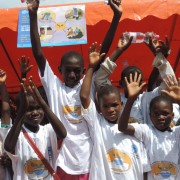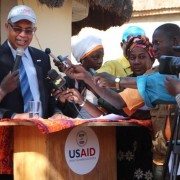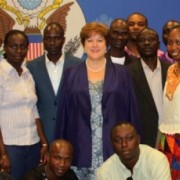
USAID/Mali and its partners, in collaboration with UNICEF/Mali and the World Health Organization, celebrated on October 15 Global Handwashing Day in Bamako and in the regions of Sikasso and Mopti. USAID/Mali highlighted its WASHplus activity (more info below) and its integrated rural nutrition and WASH activities, which focus on building resilience through the prevention and treatment of under nutrition while targeting the first 1,000 days of a child’s life.

On January 14, USAID/Mali launched a five-year livestock project as part of its Feed the Future activities. The project addresses constraints faced by Malian Livestock producers, including poor animal health due to seasonal volatility of feed and water supplies, loss of traditional pastureland to cropland, and limited capacity of producers to improve their stock and better manage risk as well as suppliers’ lack the knowledge and capacity to effectively market products and services to small producers and herders.
Reports of GBV in Northern Mali stemming from the 2012 rebellion and occupation are alarming. People living in the North suffered the brunt of socio-political and economic consequences of the armed occupation. During and following the crisis, the situation for women deteriorated dramatically.

Sixteen agricultural science students from Mali are set to embark on a program sponsored by the U.S. Government under the Feed the Future initiative and designed to strengthen the agricultural research capacity of Malian institutions. The students will first study intensive English for six months before pursuing Masters and PhD-level degrees in various agricultural fields at African higher education institutions in Kenya, Ghana and South Africa.








Comment
Make a general inquiry or suggest an improvement.